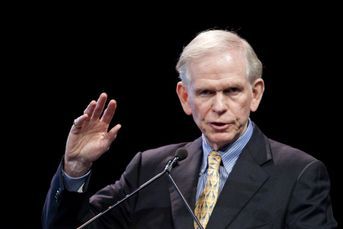Nasdaq to pay $10 million to settle SEC Facebook case
IPO debacle of social media darling led to losses of almost $500 million.
Nasdaq OMX Group Inc. agreed to pay $10 million to settle Securities and Exchange Commission charges that its mishandling of Facebook Inc.’s initial public offering last year was a violation of securities laws.
Regulators cited the second-largest operator of U.S. equity markets for its “poor systems and decision-making” during the IPO in May 2012 that was delayed by a computer malfunction. Nasdaq agreed to the settlement without admitting or denying the SEC’s findings, according to a statement released today. The payment is the largest with an American exchange, which enjoy legal protections because of their self-regulating role.
“Our focus in this investigation was on the design limitation in Nasdaq’s system and the exchange’s decision making after that limitation came to light,” Daniel M. Hawke, chief of the SEC Enforcement Division’s Market Abuse Unit, said in the statement. “Too often in today’s markets, systems disruptions are written off as mere technical ‘glitches’ when it’s the design of the systems and the response of exchange officials that cause us the most concern.”
Brokers handling Facebook (FB) orders in the May 2012 IPO claimed they lost hundreds of millions of dollars after a design flaw in Nasdaq’s software delayed the stock’s open and left them confused about whether or not they owned shares. Today’s settlement is in addition to Nasdaq’s proposal to pay $62 million to compensate member firms for losses.
Nasdaq shares gained 0.8 percent to $31.71 as of 2:36 p.m. in New York.
Processes, Contingency
The SEC penalty was imposed because Nasdaq failed in its obligation to ensure that systems, processes and contingency planning are robust and adequate to manage an IPO without disruption to the market, the agency said.
“The settlement is another important step forward,” said Nasdaq Chief Executive Officer Robert Greifeld in an open letter e-mailed to Bloomberg News. “We have put in place innovative safeguards and taken a number of steps to help ensure that Nasdaq continues to deliver the world’s best trading technology.”
Greifeld said in the letter that Nasdaq has created positions for chief information officer and global head of market systems, changed its IPO, opening and closing crosses, implemented new processes for changing technology and established a group focused on testing the quality of its trading systems. The company handled 77 IPOs and raised $7.99 billion for investors and listed companies since last May, the letter said.
Violated Rules
The SEC criticized Nasdaq executives for failing to delay trading of Facebook in the secondary market when they gathered on the morning of May 18, 2012, for a “code blue” conference call to discuss the software problems that were coming to light.
While exchange managers had removed lines of computer programming code with the expectation that it would solve the issues, it didn’t, and more than 30,000 Facebook shares remained stuck in Nasdaq’s system for two hours without execution or cancellation, according to today’s statement.
“Nasdaq’s decision to initiate trading before fully understanding the problem caused violations of several rules,” the regulator said. “They did not understand the root cause.”
Nasdaq’s net income fell 51 percent to $42 million during the first quarter because of charges related to the Facebook IPO. The profit figure included the $10 million set aside for the SEC probe as well as the $62 million regulators have cleared as company’s plan to compensate brokers for the Facebook debut.
Bonus Cuts
Greifeld saw his 2012 cash bonus fall by 62 percent to $1.35 million, in part because the compensation committee reduced it by $542,100 after the Facebook IPO, according to a regulatory filing last month. Anna Ewing, Nasdaq’s executive vice president in charge of global technology, had her bonus cut by $263,625 in connection with the offering.
NYSE Euronext, the biggest U.S. exchange operator, agreed to pay $5 million in September to the SEC to resolve regulatory claims that the New York Stock Exchange violated rules by giving certain customers a head start on trading information. The penalty was the first of its kind against an exchange.
The pricing of the first public Facebook transaction, a trade known as the IPO cross, took a half hour longer than Nasdaq planned because of technical malfunctions. Days later, Greifeld acknowledged “poor design” in software put the opening auction into a loop that delayed its completion.
$500 Million
Citigroup Inc., Chicago-based Citadel LLC, UBS AG in Zurich and Knight Capital Group Inc. (KCG) in Jersey City, New Jersey, operate equity wholesaling groups, brokers that execute orders for individual investors sent by securities firms such as Charles Schwab Corp., TD Ameritrade Holding Corp. and Fidelity Investments. Combined, the firms claim they lost almost $500 million in the offering.
The delays were the first signs of trouble in the Facebook IPO that burned investors and prompted lawsuits against the company, its exchange and the underwriters. The stock is still down more than 37 percent from the price set by underwriters. It slipped 2.3 percent to $23.54 today.
Facebook was priced at $38 on May 17. The IPO cross took place at 11:30 a.m. New York time the next morning, a half hour later than Nasdaq planned. About 30 minutes after that, the market owner reported a delay confirming trades from the opening auction with the brokers that placed orders.
The transaction reports, normally distributed immediately, were sent at 1:50 p.m., leaving market makers, brokers and their customers uncertain about whether orders submitted into Nasdaq’s opening cross had been executed. Traders and individuals couldn’t sell to limit losses until they received the reports and knew how many shares they held.
“It was a mess by their own admission,” Mark Coffelt, who manages $75 million as president of Empiric Advisors Inc. in Austin, Texas, said in a phone interview today. “It burned a lot of firms.”
— Bloomberg News —
Learn more about reprints and licensing for this article.








